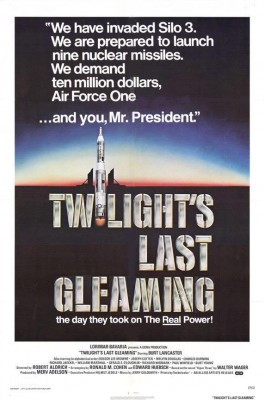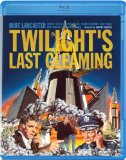| Reviews & Columns |
|
Reviews DVD TV on DVD Blu-ray 4K UHD International DVDs In Theaters Reviews by Studio Video Games Features Collector Series DVDs Easter Egg Database Interviews DVD Talk Radio Feature Articles Columns Anime Talk DVD Savant Horror DVDs The M.O.D. Squad Art House HD Talk Silent DVD
|
DVD Talk Forum |
|
|
| Resources |
|
DVD Price Search Customer Service #'s RCE Info Links |
|
Columns
|
|
|
Twilight's Last Gleaming
What is undeniably very satisfying is distributor Olive Film's flawless high-def presentation, maybe the best I've seen so far for a 1970s 1.85:1 release. The film was a U.S. and West German co-production with Lorimar and originally released by Allied Artists. The German co-producer and its present owner, Bavaria Media GMBH, did a major restoration and the results are spectacular. I've seen high-def versions of 65mm productions that didn't look half this good.
Set in what was then the near future, November 1981, the film opens well, with disgraced former Air Force General Lawrence Dell (Burt Lancaster), having escaped from military prison with coconspirators Willis Powell (Paul Winfield*), Augie Garvas (Burt Young), and Hoxey (William Smith), expertly gaining control of a remote ICBM complex and its nine nuclear missiles. Hoxey turns out to be an unpredictable psychopath and is killed early on, but the other three lock themselves deep in the vault-like underground launch control center and deactivate various booby-traps and countermeasures designed to prevent just such a terrorist act.
Powell and Garvas are in it for the money, demanding $10 million ransom apiece, but Dell is an idealist thinking only of the greater good. By telephone he contacts the President of the United States, David T. Stevens (Charles Durning), insisting he make public suppressed documents concerning the (recently-ended) Vietnam War. Or else.
As General Mackenzie (Richard Widmark), who has a personal grudge against Dell, leads a team trying to infiltrate and take back control of the base, the President's Cabinet - including longtime friend Brig. General O'Rourke (Gerald S. O'Loughlin), Secretary of State Arthur Renfrew (Joseph Cotten), advisor Zachariah Guthrie (Melvyn Douglas), Attorney General William Klinger (William Marshall), CIA Director Ralph Whittaker (Leif Erickson), Air Force General Peter Crane (Charles McGraw), and the Chairman of the Joint Chiefs of Staff (Simon Scott) - discuss the ramifications of the shocking document, heretofore unknown to President Stevens, most of the film nervously and effectively split-screens the growing tension between Dell at the ICBM complex, the President and his Cabinet at the White House, and reckless, gung-ho Gen. Mackenzie and his men.
Robert Aldrich's filmography is all over the map, wobbling between pulpy art (Kiss Me Deadly, The Big Knife, The Flight of the Phoenix, Emperor of the North), cleverly calculated commercial hits (What Ever Happened to Baby Jane?, The Dirty Dozen, The Longest Yard), and positively unwatchable dreck (4 for Texas, Hustle).
Twilight's Last Gleaming reflects Aldrich's interest in liberal-leaning, cynical, and often apocalyptic stories, with frequent collaborator and fellow liberal Burt Lancaster, who'd played a similar role in John Frankenheimer's Seven Days in May (1964), again along for the ride. Reportedly Aldrich added political content to the movie not found in Walter Wager's** original novel.
The Big Secret seems to have been inspired by the controversy surrounding the Pentagon Papers though specifically based on Henry Kissinger's 1957 book Nuclear Weapons and Foreign Policy. (Spoilers) Specifically, a military policy to fight limited and geographically confined wars and a willingness to sacrifice, ultimately pointlessly, American lives just to prove to the Communist powers the U.S.'s resolve and its capacity for "inhuman acts."
This might have seemed quite shocking in 1977 but in 2012, what with issues of Halliburton and for-profit perpetual limited war now openly discussed the President's moral outrage at this revelation makes him appear terribly naïve. (More Spoilers) That in order to suppress these documents his Cabinet would pressure him into almost literally falling on his sword strains credibility, and the end of the film doesn't approach the impact it clearly wants.
Lancaster's character is likewise muddled, if engrossingly portrayed. Dell is depicted as a True Believer, a patriot who believes in honor, and who trusts the President implicitly because, simply, "he would not lie." Some find fault with the premise of a soldier so outraged by tens of thousands of deaths that he would threaten to kill millions to expose the truth, but the superb TV film Special Bulletin made the idea of peace activists threatening to use nuclear weapons believable. Here it's just not very well done.
The performances are widely variable, with Durning and O'Loughlin burning a bit hot while Lancaster and Douglas are compellingly subtler. Aldrich lets inaptly cast Burt Young run rampant; it's like having Leo Gorcey running around in the middle of Fail-Safe.
DVD Savant admired the film's miniatures of the missile silos, which are indeed very impressive in some shots (which specifically appear to be foreground miniatures) but in high-def and on big monitors look pretty phony in others.
Video & Audio
As noted in more detail above, the transfer for this recently restored 1.85:1 release is picture perfect, just about flawless in every respect. Detail is extremely impressive, and colors and contrasts are accurate, all of which add up to a maximized viewing experience, especially in terms of the many split-screen sequences, which make up as much as one-quarter of the film's running time. The film was very difficult to see for many years; I'm glad I resisted the full-frame Japanese DVD released in 2004. The monophonic audio (English only, no subtitle options) is likewise excellent. According to some sources, Twilight's Last Gleaming was originally exhibited with an intermission, and there's an obvious position for it in the film, but here it runs straight through without a break.
Extra Features
Olive's Paramount-owned releases typically have no extras, supposedly because Paramount won't approve them. Probably as this title was licensed from Bavaria Media there were no restrictions (it was an Allied Artists release in 1977) and so it includes "Aldrich Over Munich," a 69-minute documentary about the film and its place in Aldrich's oeuvre. Overlong but interesting and well made, it features actor O'Loughlin, assistant director Wolfgang Glattes, Adell Aldrich (Robert's daughter), and writer Alain Silver. The documentary is preceded by profuse apologies for "minor ghosting" issues on the featurette, but they're barely noticeable.
Parting Thoughts
Though not entirely successful, Twilight's Last Gleaming was Aldrich's last major work (though I confess much fondness for The Frisco Kid, which has its moments) and it revisits many of the themes that preoccupied much of his long if hit-and-miss career. Olive Film's presentation is exemplary and the Blu-ray comes Highly Recommended.
* Upon entering the complex deep underground actor Paul Winfield remarks, "It's like Star Trek all over again." Five years later Winfield would again find himself in a deep underground complex, in Star Trek: The Wrath of Khan.
** Not to be confused with producer Walter Wanger.
Stuart Galbraith IV is a Kyoto-based film historian whose work includes film history books, DVD and Blu-ray audio commentaries and special features. Visit Stuart's Cine Blogarama here.
|
| Popular Reviews |
| Sponsored Links |
|
|
| Sponsored Links |
|
|
| Release List | Reviews | Shop | Newsletter | Forum | DVD Giveaways | Blu-Ray | Advertise |
|
Copyright 2024 DVDTalk.com All Rights Reserved. Legal Info, Privacy Policy, Terms of Use,
Manage Preferences,
Your Privacy Choices | |||||||














